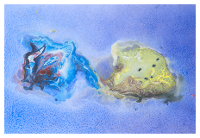Speaker
Miha Mihovilovic
(Johannes Gutenberg-Universitaet Mainz)
Description
The discrepancy between the proton charge radius extracted
from the muonic hydrogen Lamb shift measurement and the best present
value obtained from the elastic scattering experiments, remains
unexplained and represents a burning problem of today's nuclear physics.
After more than 50 years of research the radius of a basic
constituent of matter is still not understood.
This discrepancy created a great excitement in the physics community,
because it rigorously tests the theory of quantum electrodynamics and our
understanding of nuclear physics. Since the observation of the discrepancy
in 2010, various explanations for the problem have been offered, ranging from
trivial experimental mistakes to those that suggest the need for physics
beyond the Standard model. Some of the explanations
have already been rejected, while the intriguing ideas, like the introduction
of a new mediator particle, still need to be tested. Therefore, several new
experiments have been proposed that will provide new constraints
to the existing interpretations.
High-precision electron scattering experiments are scheduled at the
Thomas Jefferson National Accelerator Facility and the Mainz Microtron
accelerator at the Johannes Gutenberg University Mainz. As a complement to
these measurements, a muon-proton scattering experiment is envisioned at the
Paul Scherrer Institute. This will be the first experiment of its kind and
will provide information on proton radius from a perspective yet unexplored.
Together with the nuclear scattering experiments, new atomic experiments are
also foreseen. Very precise measurements of Lamb shift in both hydrogen and
deuterium will be performed in order to provide further insight into the
proton radius puzzle.
Summary
In the presentation results of existing proton radius measurements
will be discussed together with an overview of ongoing and upcoming
experiments, dedicated to remeasuring the proton radius
with improved statistical and systematic precision.
Author
Miha Mihovilovic
(Johannes Gutenberg-Universitaet Mainz)
